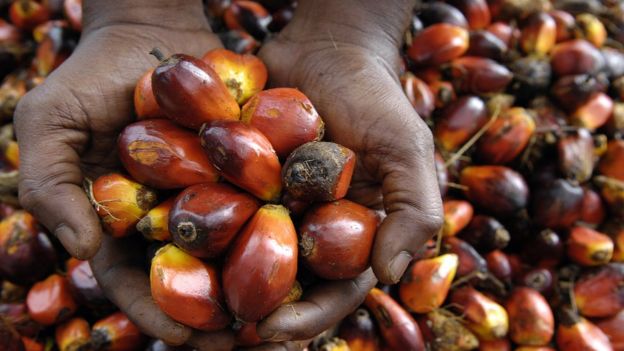Cocoa, palm oil, pulp and paper, rubber, soy, timber, beef and leather.
It’s estimated that an area the size of the UK was used abroad every year between 2016 and 2018, to meet British demand for these natural materials.
People everywhere rely on things like these for everyday products and our need for them in the UK could be making climate change worse.
It’s all to do with the trees cut down around the world to help make those products.
Globally it’s thought deforestation is responsible for about 11% of global greenhouse gas emissions.
And according to the World Economic Forum, half of the world’s tropical deforestation is illegal.
Now the UK wants big businesses to have to prove their brands aren’t linked to illegal logging. Although some say the plan doesn’t go far enough and it’s not clear what the punishments would be if businesses don’t do that.
Conservationists think many of the countries those things are coming from, and the products themselves, are strongly linked to illegal deforestation.
Chopping down trees to sell the timber, or to clear the land to produce something else there instead – without the right permission – is a multimillion-pound illegal industry.
WWF claims about 28% of the land needed by the UK every year is in countries that are “high risk” or “very high risk” in terms of the threat to nature. That’s an area about three times the size of Wales.
The group also says nearly 3,000 species, already at risk of extinction, might be being affected by producing those materials.
Take chocolate for example
Ivory Coast is by far one of the biggest global suppliers of the cocoa used to make it. But the beans are grown in areas with the most deforestation and charities say there’s even evidence of forests being cleared in protected areas.
Cocoa traders don’t say where their beans came from when they supply the UK market, so there’s nothing to stop illegally produced cocoa being sold in the UK.
Palm oil alone is in so much of what we use in the UK, including nearly half of the packaged products found in supermarkets.
Then there’s palm oil
It’s made from the fruit of palm trees and it’s where everyday items like pizzas, doughnuts, nut butters and cosmetics like shampoos, deodorants and toothpastes come into the mix.

Indonesia is the world’s biggest producer. But between 2011 and 2018, the country’s West Kalimantan province lost enough trees cover to cover the size of Wales.
Major palm oil traders who import into the UK source from a large number of mills. But less than 10% of these are certified by the Roundtable on Sustainable Palm Oil. The organisation wants global standards for sustainable palm oil.
Some brands now promise to be totally free of palm oil.
How does deforestation affect climate change?
Trees can help prevent climate change by capturing and storing huge amounts of carbon dioxide from the air and carbon dioxide, (partly from humans burning fossil fuels), one of the major gasses contributing to rising global temperatures.
But when the trees are cut down, and often burned, that carbon gets back into the atmosphere.
Forests also create their create their own weather systems, circulating water and rain. If you take the trees away, it can lead to desertification.
Just look at the Sahara Desert, which 6000 years ago was a tropical jungle.
Worries closer to home
As well as contributing to deforestation around the world, there are also worries that deforestation might be happening in the UK too.
The Woodland Trust says it knows of at least 800 woods under threat and claims it’s mostly down to building plans.
It’s worried that the number of new woods being planted in place of those being cut down are “seriously low”, despite an internationally binding agreement not to get into a state of deforestation.
The government tells Newsbeat its priority is to plant trees, not cut them down.
“We know trees are a precious natural asset and central to the fight against climate change, which is why we’re committed to increasing tree planting across the UK to 30,000 hectares per year by 2025,” says a spokesperson for the Department for Environment, Food and Rural Affairs.

